 Petzlover
Petzlover Cavachon is originated from United States but Newfoundland Dog is originated from Canada. Cavachon may grow 41 cm / 16 inches shorter than Newfoundland Dog. Cavachon may weigh 70 kg / 154 pounds lesser than Newfoundland Dog. Cavachon may live 5 years more than Newfoundland Dog. Cavachon may have less litter size than Newfoundland Dog. Both Cavachon and Newfoundland Dog requires Moderate Maintenance.
Cavachon is originated from United States but Newfoundland Dog is originated from Canada. Cavachon may grow 41 cm / 16 inches shorter than Newfoundland Dog. Cavachon may weigh 70 kg / 154 pounds lesser than Newfoundland Dog. Cavachon may live 5 years more than Newfoundland Dog. Cavachon may have less litter size than Newfoundland Dog. Both Cavachon and Newfoundland Dog requires Moderate Maintenance.
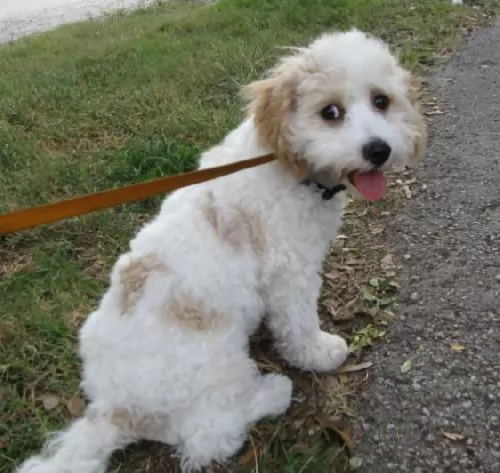 The Cavachon dog is a mix of the Bichon Frise and a Cavalier King Charles Spaniel. There isn’t much on the history of the dog but it seems as though certain kennels in Berryville, Virginia, in the United States are the first breeder of the dog, establishing the hybrid dog in 1996.
The Cavachon dog is a mix of the Bichon Frise and a Cavalier King Charles Spaniel. There isn’t much on the history of the dog but it seems as though certain kennels in Berryville, Virginia, in the United States are the first breeder of the dog, establishing the hybrid dog in 1996.
This attractive little toy breed has become one of the most popular cross-breed dogs to own in the United Kingdom, United States, Europe and other parts of the world. As it is a hybrid, the Cavachon isn’t recognized by the American Kennel Club (AKC), but it is recognized by the American Canine Hybrid Club (ACHC).
 The Newfoundland dog is a large working dog. They were bred and used as a working dog for fishermen in the Dominion of Newfoundland, an eastern province of Canada. With their web feet they were also used for water rescue.
The Newfoundland dog is a large working dog. They were bred and used as a working dog for fishermen in the Dominion of Newfoundland, an eastern province of Canada. With their web feet they were also used for water rescue.
The history of the Newfoundland Dog is unsure, but the breed as we know it today originated from dogs which were brought from Newfoundland to England in the early 1800's.
The Newfoundland Club was founded in 1886 so as to promote the breed.
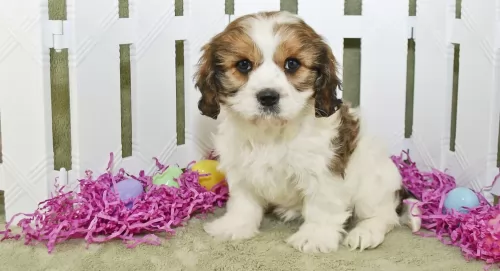 Cavachons are small dogs standing from 31 - 33 cm at the withers and weighing 4.5 - 9 kg. He has a medium-to-long silky coat which can be slightly wavy or even straight. The coat is available in several different colors – with white being the main color and he’ll have patches of apricot, tan and black or a mix of these colors.
Cavachons are small dogs standing from 31 - 33 cm at the withers and weighing 4.5 - 9 kg. He has a medium-to-long silky coat which can be slightly wavy or even straight. The coat is available in several different colors – with white being the main color and he’ll have patches of apricot, tan and black or a mix of these colors.
Individual dogs will vary to some extent depending on which parent breed is more dominant, but they’ve generally got a compact, well formed body and short legs. People with allergies appreciate this breed as they don’t shed a lot.
The Cavachon isn’t aggressive at all and they are sweet dogs, enjoying being around children. Their wonderful nature makes them a great therapy dog as they love to charm and delight people. He is tolerant of the actions of children as well as being able to get on well with other dogs and cats in the home.
Even small dogs like the Cavachon however can benefit from training and socialization, and then he becomes a wonderful obedient little dog. He is actually more robust than he looks and this is what makes him such a good pet for children.
He is a social little dog and just loves his human family and doesn’t want to be left alone for any long lengths of time. His lack of aggression means you can’t really rely on him to be much of a guard dog although he will give you some warning with his barking.
 The Newfoundland is a large dog standing at between 63cm to 74cm, both male and female. Weight can vary from 45kg to 80kg.
The Newfoundland is a large dog standing at between 63cm to 74cm, both male and female. Weight can vary from 45kg to 80kg.
He has a double coat of medium-length straight hair and the hair can be black, brown or gray. Although it is common for the Newfoundland to have a solid-colored coats, you will sometimes find small patches of white on their chest, toes, or at the tip of the tail. Then again you get the less common Newfoundlands where the coat is white with some black markings and these are known as Landseers.
The outer coat is coarse, oily and water-resistant quality, suited to a dog that loves to spend time in the water. The head is broad and large with small ears that he keeps lying close to his head. The tail is long and plumed and the feet are wide with webbing between the toes which aids him with swimming.
As with many large dogs, the Newfoundland is docile and his sheer size makes it that he is best suited to life in the countryside as opposed to living in the city. This is also because this particular dog wants to be close to water where he can swim.
He is a trustworthy, loyal dog and will get on well with children and pets in the home. Training and socialization is always recommended for any dog, but a big dog can often ‘get in the way’ indoors and you want him to lie down or sit when you tell him to. He is an intelligent dog so will respond well to training.
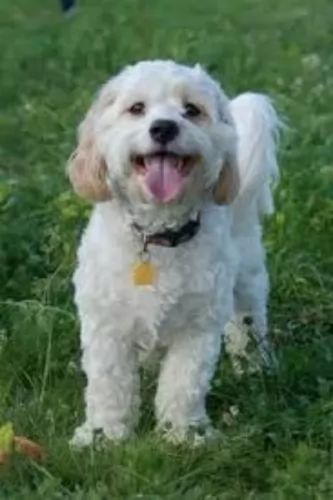 The sweet Cavachon is a balanced, happy, social dog and with his amicable nature and appealing looks, everybody wants him as a friend. He is fun and entertaining and makes a wonderful family pet and playmate for children.
The sweet Cavachon is a balanced, happy, social dog and with his amicable nature and appealing looks, everybody wants him as a friend. He is fun and entertaining and makes a wonderful family pet and playmate for children.
He gets on well with other pets in the home too. Even though he is a small dog, he will require training and socialization as his cuteness tends to make him want to assert himself over his owner. With socialization he becomes the most awesome, loyal and devoted little companion.
 Your beautiful, cuddly puppy will soon become a giant dog with a big appetite. Don’t just buy a cute puppy if you can’t afford to feed him properly and you can’t give him lots of attention.
Your beautiful, cuddly puppy will soon become a giant dog with a big appetite. Don’t just buy a cute puppy if you can’t afford to feed him properly and you can’t give him lots of attention.
Your dog will also be shedding, so be aware of these aspects before you bring a large Newfoundland into your home. He is a gentle dog, but his size could be worrisome if he isn’t trained, socialized and supervised.
Newfoundlands are amicable dogs, and while he may like to spend times indoors with you relaxing, he is a working dog and will require exercise and activities for mind and body.
Give this giant of a dog a loving home, and you will have a special, devoted friend like no other.
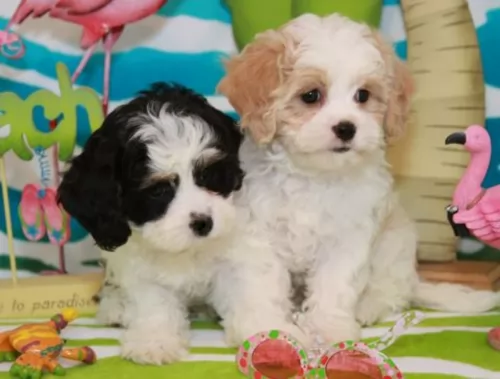 Although a mixed breed such as the Cavachon is considered healthy, they can still have their share of health problems. Some of the common health problems that the Cavachon may have to contend with and which come from the Cavalier King Charles Spaniel and the Bichon Frise are ear infections, liver problems, hip dysplasia and eye problems.
Although a mixed breed such as the Cavachon is considered healthy, they can still have their share of health problems. Some of the common health problems that the Cavachon may have to contend with and which come from the Cavalier King Charles Spaniel and the Bichon Frise are ear infections, liver problems, hip dysplasia and eye problems.
A healthy Cavachon who has been fed well and nurtured can live to be up to 15 to 18 years.
Arthritis is a disease seen in many dogs and it is inflammation of the joints because of wear and tear. You’ll notice lameness with your pet, stiffness, swelling, heat and pain and even depression.
Your pet may even display some aggressive behavior because of the pain, but this is excusable as this isn't an aggressive breed. Osteoarthritis is seen more often in senior dogs. Thankfully the good news is that arthritis can be managed by your vet.
 The Newfoundland can be prone to serious health conditions such as hip dysplasia and gastric torsion. Deep chested dog breeds like the New Foundland are susceptible to bloat, a life threatening condition where the stomach swells, it can twist and the dog can die if help isn’t available. He will be salivating, restless and whining while also trying to vomit.
The Newfoundland can be prone to serious health conditions such as hip dysplasia and gastric torsion. Deep chested dog breeds like the New Foundland are susceptible to bloat, a life threatening condition where the stomach swells, it can twist and the dog can die if help isn’t available. He will be salivating, restless and whining while also trying to vomit.
Giant breeds are also prone to elbow and hip dysplasia, a genetic problem which can ultimately affect your dog’s mobility.
When in any doubt about your pet’s health, get him to the vet.
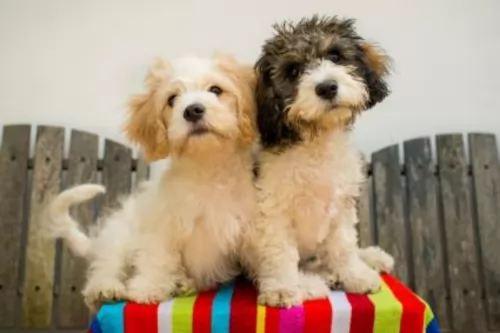 The Cavachon is a small dog, so if you have a nice sized garden, a lot of his exercise needs will be met. However he will still want a walk every other day and appreciate ball games in the garden. He can adapt to living in much smaller places but then he will certainly need to be exercised.
The Cavachon is a small dog, so if you have a nice sized garden, a lot of his exercise needs will be met. However he will still want a walk every other day and appreciate ball games in the garden. He can adapt to living in much smaller places but then he will certainly need to be exercised.
Small dog breeds like the Cavachon have a quick metabolism and you want to feed him a top quality dog food high in protein and fat. Protein is important as it supports growth in puppies and promotes lean muscle mass in adult dogs.
The Cavachon’s hair sheds very little, so grooming and brushing will only be required twice a week. His hair may need to be clipped every now and then to keep him well groomed. If you don’t have the experience or the required tools, a professional dog salon in your area will be able to do it for you.
The nails must also be clipped regularly and the ears kept clean and dry to prevent ear infections. His teeth will need to be cleaned at least 2 or 3 times a week with special dog toothpaste and toothbrush to prevent dental decay.
 Your dog’s coat will need to be brushed at least twice a week as he is a heavy shedder.
Your dog’s coat will need to be brushed at least twice a week as he is a heavy shedder.
Do the nails of your dog as soon as they start getting long. Long nails can hook on things and cause injury to the dog’s paw area.
This is a dog with floppy ears so check inside the ears to prevent ear infections, more so because this is a water-loving dog. The dampness inside the ears can cause bacteria.
This is a giant breed and sadly, they have the shortest lifespans. You want to make sure that you keep your giant breed as healthy as possible to ensure he reaches the 10 or so years allotted to him and to also prevent health problems.
Make sure your giant breed puppy and adult has the very highest quality commercially manufactured food to ensure he gets the right balance of nutrients in. This food also makes sure that your puppy rather grows at a slower rate and stronger as opposed to growing too quickly. Rapid growth comes with joint problems.
All dogs, large and small, don’t want exotic, strange food that upsets their stomachs. They want consistency and simplicity and they want tasty food. Give him some homemade food such as cooked chicken, brown rice or pasta and some vegetables such as sweet potato, carrots and spinach. You can add this occasionally to his dry kibble.
Add in some raw meat from time to time too. Your pet will be strong, healthy, happy and content.